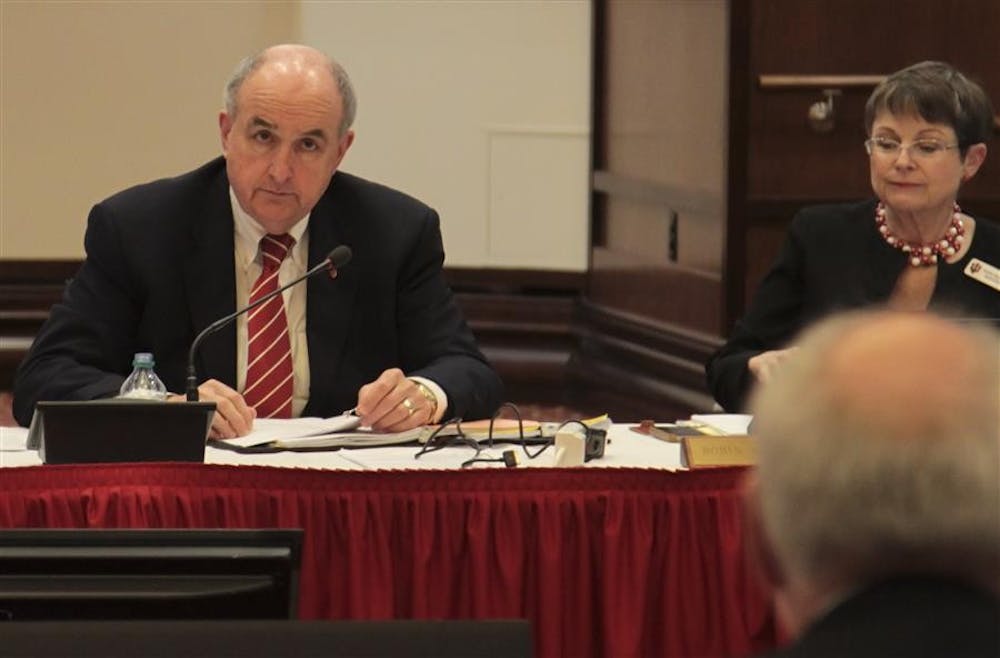Entering through side doors of Franklin Hall to avoid a crowd of IU on Strike participants, the Board of Trustees gathered Thursday afternoon to complete one of the shortest meetings of the year.
Unlike last year’s April meeting in Bloomington, there were no disruptions during the three committee reports and business meeting that approved all action items on the agenda.
Interim Vice President and Chief Financial Officer MaryFrances McCourt led the finance and audit committee, focusing on improving student affordability and cost of living in Bloomington.
“There are so many different facets to the affordability issue, we thought it would be important to understand a deeper level that goes into these metrics,” said Todd Schmitz, executive director of university institutional reporting and research.
The committee presented a graph that compared student “net price” between large research universities. The net price of IU, a calculation that determines the average tuition a student pays after financial aid, was relatively smaller than most of the other universities on the chart.
While the board was pleased with the results, they encouraged McCourt and her team to gather a peer-comparison of debt per student to see how IU matches up.
“I’m positive that if you only look comparably, you kid yourself,” Trustee Thomas Reilly said, warning the committee to look beyond comparisons. “It’s better to be the best, but you don’t want to be the best of a group that isn’t doing well.”
McCourt also cited the financial literacy program MoneySmarts, which incoming students will be required to take next fall at all IU campuses. The program is part of the IU College Affordability initiative.
“There is no university that is doing this with the numbers that we are doing it,” McCourt said.
The Facilities Committee, led by the vice president for capital planning and facilities, updated the board on a number of Bloomington construction projects on track to be completed by their set date, including Forest Dining Hall, Indiana Memorial Union Alumni Hall and Jacobs School of Music studio building.
Chair of the Board of Trustees Bill Cast noted that the University preferred to fund new buildings through endowments and use University money to renovate and refurbish buildings that already existed. The new Jacobs building and the expansion to Kelley School of Business are both funded through Lilly Endowments. The new Rose Avenue Residence Hall is funded by auxiliary revenue bonds repaid through Residential Programs and Services revenue.
“With every new building comes R and R,” Cast said. “To keep our footprint smaller, we refurbish old buildings.”
Morrison and his Associate Vice President John Lewis reported that phase one of the $37 million Kelley School expansion and renovation is almost complete. The final product is estimated for completion by August 2014.
The committee also noted the Bloomington campus has seen a 43 percent reduction in carbon emissions in the past year due to the University’s switch from coal to natural gas.
The academic affairs committee meeting was brief, with Vice President John Applegate reporting on IU cyber security and a motion to officially honor fallen IUPD Police Chief Keith Cash.
During the faculty report, Bloomington Faculty Council President Carolyn Calloway emphasized the importance of the state legislature staying out of affairs directly related with faculty and staff decisions.
The board agreed.
“Academia and curriculum are kept best in the hands of our faculty, and there are boundaries that legislatures can not cross,” Trustee Patrick Shoulders said.
During the relatively brief business meeting at the end of the day, a small number of the total protesters who chanted outside Franklin hall filed into empty seats while the remaining crowd moved to Woodburn Hall.
The audience remained quiet while the board passed all action items including renovations for Phi Kappa Psi Fraternity, road improvements on 17th Street and Jordan Avenue, a Wells Library sprinkler and infrastructure renovations.
IU on Strike did not interrupt or disrupt the meeting, but Cast was critical of the group, noting many of the problems proposed by IU on Strike had already been recognized by the Trustees. Solutions to these issues in regard to the university have long been in the works, he said.
“I don’t think the protest is very effective,” Cast said. “I thought the response of the provost was very appropriate. If you have ideas to protest, you should overcome with your ideas.”
Above all, the trustees appreciated thoughtful and well-articulated student voice, not “shooting from the hip,” he added.
The trustees occasionally receive fiery emails from students, and often, they will compile those emails and make a board-wide response to the issues. If a student sent a member of the board a thoughtful, articulate email, that member may respond, he said.
“I would ask, ‘Well, what have you done so far?’ and usually the answer is ‘Nothing…I have no idea what’s going on,’” Cast said. “It helps to know if you had a skeleton or a framework to hang something on.”
The journalism, telecommunications and communications and culture merger as well as discussion about parking financing were pushed to meetings later in the year.
The committees only had partial data on both issues, Cast said, so the trustees decided to consider those action items at a later date.
Trustees meet amidst protest

Get stories like this in your inbox
Subscribe



